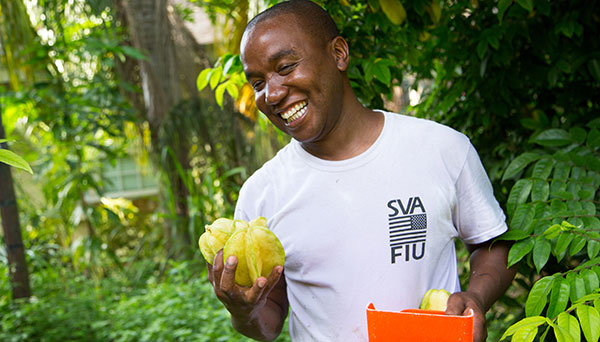Enhancing Local Food Security through the Farmer-to-Farmer Model as a Rapid Response to the COVID-19 Pandemic
Organization: Florida International University Foundation
The FIU Foundation is a non-profit corporation governed by a board of directors. Its members play a significant role in the development of Florida International University as a major educational, cultural and economic resource.
Location: Miami-Dade and Alachua Counties, Florida
Country: United States
Other Organizations Involved: FIU International Center for Tropical Botany, University of Florida, Urban Oasis Project, Gainesville Giving Garden, Gainesville Black Garden Network, Working Food, National Wildlife Federation, Florida Food Policy Council, Miami-Dade County Department of Regulatory and Economic Resources

©FIU Agroecology
Background
Florida has a unique agricultural landscape with the potential to grow a wide range of tropical crops. Even so, extreme climate events, the recent COVID-19 pandemic, social inequity, and environmentally unsustainable land management practices are having a tremendous impact on food security, a paradox in a landscape capable of producing a diversity of food crops. Although the agricultural sector dominates the Florida economy, small-scale urban farmers are often underserved for training and valuable resources. Consequently, Florida’s economy and food system are missing an important opportunity to better serve and engage these farmer communities. Accordingly, it is critical to develop sustainable solutions to address food production and accessibility, especially in low-income neighborhoods that are considered “food deserts”.
The project will target historically underrepresented non-commercial farmers and gardeners in the urban landscapes of Alachua and Miami-Dade Counties, where food insecurity rates are high. This is particularly an important outreach effort, as the pandemic has motivated many individuals in the urban landscape to search for alternative sources of food.
Goals
- Objective 1: Strengthen existing farmer-to-farmer networks in Miami-Dade and Alachua Counties (Florida).
- Objective 2: Measure small-scale, urban agroecosystem productivity, sources of harvest loss, adaptive management measures that will benefit the environment, and seed conservation strategies.
- Objective 3: Assess the perceptions, behaviors, challenges, and opportunities for new and beginning farmers from historically underserved communities to adopt Climate Smart Agricultural strategies and enhance community resilience.
- Objective 4: Train undergraduate students from the University of Florida and Florida International University in local urban farm and food security issues.
Main activities
- Through the collaboration with the non-profit partners, the participating farmers/gardeners will promote farmer-led workshops, and assist with sustainable seed-saving strategies across project sites.
- Additionally, they will assess the socio-environmental benefits of food production that use Climate Smart Agricultural practices (e.g., integrated pest management, biodiversity conservation, soil conservation), and will identify the primary challenges that confront producers in the urban landscape.
- FIU’s team will also initiate one of the first cross-regional urban agricultural monitoring systems in the State of Florida, providing a forum for discussion on small-scale urban agricultural systems as a viable food security mitigation strategy.
Outcomes
The network and workshop platforms developed with the project’s partners will have a substantial impact on multidisciplinary problem-solving skills needed to address the complex challenges associated with environmental changes in the urban setting. The results will be shared with policymakers and researchers at national conferences, workshops and symposia that focus on the growing urban agricultural and environmental education fields. The farmer-to-farmer extension model will also help local collaborators plan for implementation and care of these unique systems.